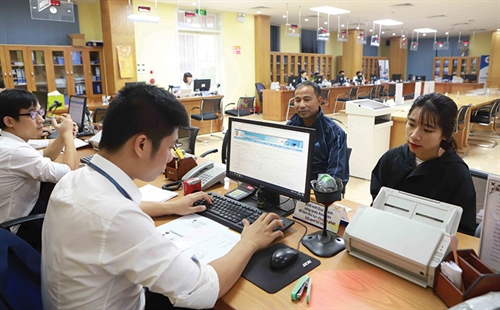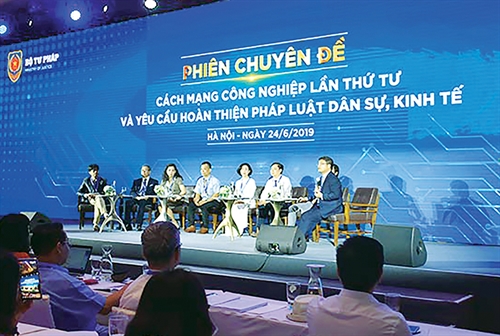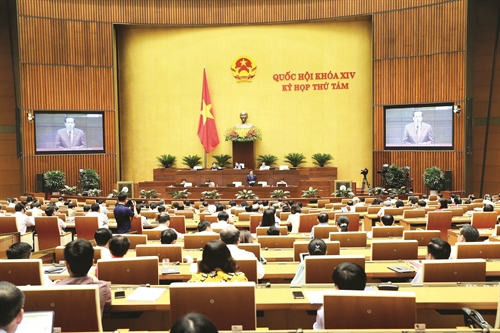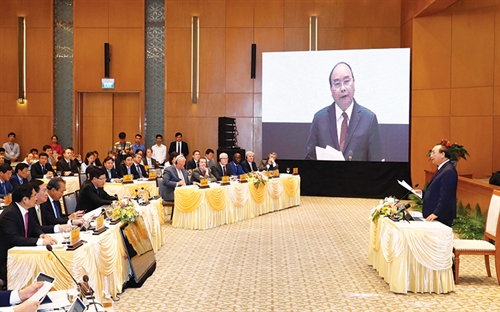The Fourth Industrial Revolution (4IR) affects many areas of social life, including public administration. It can govern, change the content of requirements and principles of public administration and also impose some completely new requirements and principles. It is, therefore, necessary to fully identify the requirements of public administration in the context of the 4IR for determining appropriate standards and solutions to ensure that the public administration is operated and developed for the target of national development.
Tao Thi Quyen & Ha Cong Tuan[1]
Public administration is the activity of agencies, organizations, and individuals competent to manage the state administration, use public resources to perform the assigned functions, tasks, powers or activities of organizations and individuals authorized to provide public services.
The requirements and principles of systematic and consistent public administration reflect the objective laws of social mobilization, nature, and public administration relations. They also direct and govern the organization and public administration activities to guarantee the goals of public administration. From these requirements and principles, standards and behavior-oriented models of agencies, organizations, and individuals in the public administration have been set up.
The 4IR is being formed with a development trend based on the highly integrated platform of the digital-physical-biological connection system. The 4IR creates both opportunities and challenges for the public administration, requiring competent authorities to grasp them in time to determine the right orientation and propose appropriate solutions. It is to ensure that public administration operates and develops for national development.
The 4IR can impact, govern the content of requirements and principles of public administration or set up some new requirements and principles below:
Compliance with the Constitution and laws
It is required that public administration activities must be based on the Constitution and laws. In terms of organizational apparatus, agencies and organizations as well as working titles engaged in public administration must be established according to the Constitution and laws. In terms of activities, the contents of public administrative activities, including state management of public services and provision of public services, must comply with assigned functions and tasks and may not go beyond competence. Administrative acts must be conducted in the order and procedures prescribed by law. State administrative management decisions must be promulgated and implemented in accordance with law.
In order to ensure public administration’s compliance with the Constitution and laws in the context of the 4IR, the legal system which serves as a legal basis for the operation of the public administration should be correspondingly revised and improved. Makers of policies on public administration must innovate their thinking, enhance capacity, and work closely with the private sector and citizens to build a legal system which is adaptive to and flexible with the constant changes of society.
Additionally, laws and decisions of state management agencies must be clear, predictable and uniformly implemented. Administrative decisions must be logical and lawful and must not be issued ultra vires while state agencies may not abuse their powers to make decisions that are beneficial to themselves or certain interest groups.
 |
| Carrying out administrative procedures at Vinh Phuc province’s Public Administration Center__Photot: Hoang Hung/VNA |
Assurance of publicity and transparency
The principle of publicity and transparency in the operation of the State in general and of the state administration in particular requires state agencies to provide the public with sufficient information relating to policies and laws as well as data used as a basis for forming policies and laws.
The transparency of public administration is reflected in the constant availability of accurate, clear, complete, and easily accessible information to all individuals and organizations in society. Once public administration becomes transparent, citizens will have direct and indirect low-cost access to documents, policies, and laws of state agencies. To this end, there must be clear and reliable sources of information to serve as a basis for citizens and society to control public administration. At the same time, it requires the reform of state administrative management methods based on hi-tech platforms, with special attention to be paid to minimizing administrative procedures for businesses and citizens and ensuring transparency of the operation of state administrative agencies.
Enhancement of public involvement
This is the operating principle of the State in general and public administration in particular. The motto of implementing this principle is to trust in the people and rely on the people, and bring all issues to the people to discuss and find solutions. Thereby, people of all strata will improve their understanding of the State’s policies, laws, programs, plans, and management decisions. Hence, they will actively and voluntarily comply with laws and participate in the implementation of programs and projects proposed by state agencies.
This principle requires increasing the participation of social actors in the public administration activities from central to local levels. Such participation can be conducted directly or indirectly through organizations or legal representatives. In particular, this principle requires that state administrative agencies must consult the public through different forms relevant to each object group before the issuance and implementation of policies and laws. Meetings, seminars, exchanges, and discussions on policies and laws must be publicly facilitated for the people to participate. Drafts of legal documents should be posted in the mass media so that people can express their comments easily. At the same time, state agencies must set up a system to receive and handle comments of the people, scientists, businesses, and social organizations.
In the context of the 4IR, this principle requires the State to build an “e-government” and exercise “Electronic Direct Democracy” (EDD), and “Digital Direct Democracy” (DDD). These are the concepts “to indicate a new way of exercising direct democracy, which uses more telecommunications networks as a basis for the community to participate in the implementation of democracy”[2]. Through this, the people can propose legal initiatives, contribute legislative ideas, and vote on laws. EDD and DDD will be the most transparent, fastest, and most convenient forms which enable people to participate in public administrative activities and the State to receive reasonable and feasible comments. The application of information and communications technology allows a large number of people to express their views on issues related to the management, administration, provision of administrative services, and contribute to finding out solutions to shortcomings and inadequacies of the administration.
Assurance of equality among different social groups
In the context of the 4IR, public administration must ensure social equality. This principle requires public administrative services to be provided fairly and equally to all subjects in society regardless of their gender, class, ethnicity, and religion. At the same time, administrative agencies must pay more attention to those who are easily affected, especially vulnerable subjects, when issuing, and organizing the implementation of, legal policies.
Guarantee of accountability
Accountability is understood as the ability of state agencies, officials, and public servants to answer to people, organizations, and enterprises about what they have done, what they are doing, what they will do, and take responsibility for their actions.
Accountability is closely related to transparency, predictability, and participation of the people. Among these factors, accountability is the most important one needed to ensure the effectiveness and efficiency of public administration. “True accountability consists of two elements: the ability to answer and take responsibility for consequences”[3]. Accordingly, state agencies, cadres, and civil servants must periodically respond to what they have done, what they are doing, what they will do, how they use their authority and from what resources, and what the achieved results are. Consequences of public administrative decisions must be predictable while external control of public administration over the quality of public services must be ensured. Importantly, state agencies, cadres, and civil servants, especially heads of agencies and units, must be held responsible for the performance of their tasks as well as for any damage to the lawful interests of people and businesses. Authorities competent to promulgate and implement legal documents and administrative decisions will be responsible before not only their superior bodies and elected bodies but also the private sector, social organizations, and citizens.
Assurance of modernity, adaptability and flexibility
Public administration in the context of the 4IR must be an administration that uses modern technologies, can adapt flexibly and quickly deal with changes in society. The adaptability of public administration is expressed in the promptness and correctness of the promulgation of legal documents and especially, in the timeliness, creativity, and flexibility of competent agencies, organizations, and individuals when implementing the law.
Through the application of modern technology, administrative agencies will be able to collect and process a large volume of data and simulate, forecast, and develop management and operating scenarios from the collected data. Accurate and timely processing of data will provide administrative agencies with sufficient grounds to make the right, appropriate, and timely decision, thereby better coping with risks and improving the capacity of public administration.
At the same time, the use of modern machinery and technology will gradually replace manual operations, streamlining the contingent of cadres and civil servants and reducing operating costs of the public administrative apparatus, while legitimate demands and aspirations of people, businesses, and organizations will be promptly and quickly met.
Against the backdrop of the 4IR, online public services are provided to enable citizens and businesses to communicate with the Government around the clock wherever there is an internet connection. Transactions in the course of processing records and providing services are performed in the network environment. The payment of fees and receipt of results are made directly at agencies that provide online services. Provision of public services in the cyberspace will help state agencies reduce the workload as well as costs and time for people, thus avoiding harassment and bureaucracy and increasing the effectiveness of supervision of public administration.
Application of information technology in operations of public administrative agencies must be implemented synchronously from central to local levels, forming “e-government”. The model of public administration center will be applied and a system of authentication of electronic records of citizens, cadres, civil servants, and public employees, a nationwide information network connecting agencies and organizations, and a common database in all areas of public administration will be formed. By this way, the administrative system will operate smoothly, ensuring safety and security, improving management efficiency and effectiveness.
Assurance of effectiveness of public administration activities
This principle requires legal documents, and management and administration documents of state administrative agencies to be implemented seriously, timely, and uniformly throughout the country. At the same time, the implementation of policies, public administration laws, and management decisions must bring about greater benefits to society when comparing output with input costs. The public administration is required to serve the development needs of society based on rational and economical use of social resources while ensuring socio-economic development, stability, and sustainable development.
Promotion of supervision by people and society
This is a very important requirement of public administration in the context of the 4IR. The supervision by society and people over public administration is a basic principle and a means of controlling the state power. On the one hand, the application of information technology in management and administration of state administrative agencies helps solve and provide public services to people and businesses more quickly, economically, conveniently, and precisely. On the other hand, it makes the entire operation of administrative agencies become public and transparent, facilitating the supervision by people and society for state administrative agencies.
“The digital age with new technologies, constantly ever-changing new operating platforms, allows people to be more widely involved in policy-making activities. At the same time, public authorities can rely on a digital technology platform to optimize the social monitoring and operating system in the style of e-government, smart cities, etc.”[4]. The apparatus and public administration activities need to be public and transparent, based on digital infrastructure to increase the supervision by elected bodies and the people.
The flow of information is always mobile. Nowadays, with the support of smartphones and social media networks, several new forms of communication have appeared, enabling people to select the modes of participation in supervising activities of state administrative agencies. Information systems and forms of communication in the age of the 4IR need to restrict barriers to citizen supervision of public administration activities, e.g., removing difficulties in accessing and verifying information and mobilizing people of all classes to participate in the supervision. The scope of supervision must not be limited but be expanded while information must be multi-dimensional so as to ensure high interactivity and foster debate and social criticism.-
Ha Cong Tuan, Ph. D., the Ministry of Agriculture and Rural Development









